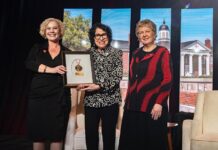LOUISVILLE, Ky. — Drinking green tea may help minimize memory problems and confusion associated with sleep disorders, according to a study recently published by University of Louisville researchers in the American Journal of Respiratory and Critical Care Medicine.
The animal study, led by David Gozal, professor and director of the Kosair Children’s Hospital Research Institute (KCHRI), found that compounds in green tea seem to make the brain less susceptible to oxygen loss caused by sleep disordered breathing, supporting other research that suggests green tea may have therapeutic value.
“Drinking green tea may prove to be one strategy to help patients cope with the cognitive side effects of sleep disordered breathing and obstructive sleep apnea,” Gozal said.
Green tea contains compounds known as green tea catechins polyphenols (GTPs). These chemicals’ antioxidant properties seem to protect against diseases associated with inflammation and oxidative stress—damage that result from the body’s interaction with oxygen—although scientists don’t fully understand why.
Sleep apnea is a condition in which an obstructed airway causes a person to snore as they struggle to breath and take in oxygen. Apnea, which increases oxidative stress and inflammation, has long been associated with learning and behavior problems as well as hypertension, cardiac disease and obesity.
In this study, two groups of rats were subjected to periodic oxygen depletion that mimicked the nightly breathing patterns of obstructive sleep apnea. During the two week study period, one group was given plain drinking water; the other, water laced with GTPs.
Both groups were tested for oxygen depletion and inflammation and given learning and memory tests in a water maze. The rats that drank the GTP-treated water negotiated the water maze considerably better than the other group of rats.
“This evidence supports other studies that suggest GTP may protect the brain and other organs from oxidative stress,” Gozal explained. “These novel findings clearly warrant further research.”
For more information, contact Anne Eldridge, (502) 852-0943.


























